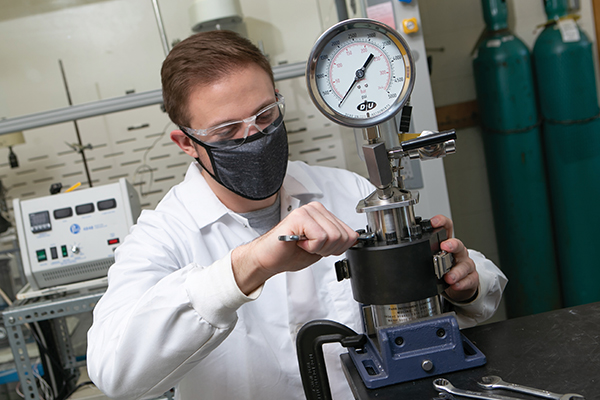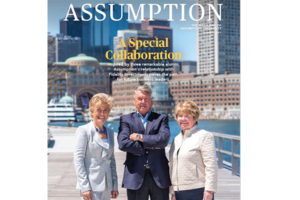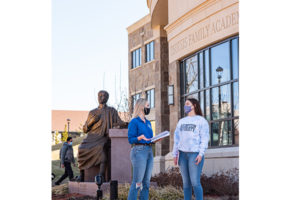
Booming Academic Partnerships Offer a Broad Spectrum of Exciting Majors and Career Pathways
Over 20 articulation agreements with colleges and universities across the nation enable Assumption students to earn dual degrees, pursue technical careers, and step on the fast track to accelerated professional and graduate degrees.
Flip on any news channel, and it’s clear that one of the biggest problems we face is how to make better use of our natural resources without harming the environment. That’s why David Kenney ’19, a Ph.D. candidate in chemical engineering at Worcester Polytechnic Institute (WPI), is researching how to convert waste products into biodiesel fuel.
“What we’re tackling here is both how to reduce our waste problem and how to create national energy independence,” he said. “It’s going to be an interesting and educational ride. I’m very excited to see where this research goes.”
Kenney has already enjoyed an interesting educational ride and not one he ever anticipated when one of Assumption’s former football coaches visited Kenney’s Long Island high school and invited him to attend Assumption’s football camp.
“I’d toyed with the idea of playing football in college,” Kenney said, “but at that point I already knew I wanted to be an engineer, so I didn’t even think of applying to a liberal arts college like Assumption.”
A couple of weeks later, however, his father pointed out that Assumption does, indeed, have an engineering degree: the University offers 3:2 programs in engineering leading to dual B.A./B.S. degrees through both the University of Notre Dame and the McKelvey School of Engineering at Washington University in St. Louis.
Qualified Assumption students can earn a B.A. in mathematics, computer science, or one of the natural sciences from Assumption in three years; then at Notre Dame, they spend two years taking courses toward a B.S. in aerospace, chemical, biomolecular, civil, computer, electrical, or environmental engineering. At Washington University, Assumption students either earn a single undergraduate engineering degree in two years or a combination of an under- graduate and master’s degree in three.
Assumption’s articulation agreements are part of the University’s commitment to affordable education and opening doors to more career pathways. Through academic partnerships with affiliated colleges and universities, Assumption students have the opportunity to earn degrees in specialized topics or areas Assumption doesn’t offer. A handful of these agreements provide guar- anteed scholarship money and preferred admission, too.
Ironically, Kenney decided against playing college football, but chose Assumption any- way, “knowing that the opportunities a dual degree would present me in the future would outweigh anything football could give me.”
Engineering isn’t done in a vacuum, noted Kenney, who earned his B.S. in chemical engineering at Washington University, where he did research that involved looking at atmospheric conditions from satellite data.
“My department head was conducting studies on everything from cancer to solar cells,” Kenney said. “There aren’t any boundaries to what you can do as a chemical engineer. Having a foundation in the liberal arts helps you think about the impact of the engineering you do at every level and to communicate better,” he said. “It’s a broader perspective than what I could have gotten if I’d only studied engineering.”
A Broader Perspective and Greater Career Options
That broader perspective is one distinct advantage of the dual-degree programs offered through Assumption’s more than 20 articulation agreements with different institutions around the country, said President Francesco Cesareo, Ph.D.
“By combining a liberal arts undergraduate experience with a more specialized program or an advanced degree, our students have the best of both worlds. They’re getting the framework they need for a career while benefiting from the breadth and depth of a liberal arts education,” he said.
These academic partnerships also give students access to more majors. In addition to engineering, Assumption offers articulation agreements with other universities leading to dual degrees, professional degrees, or graduate degrees in fields as wide ranging as chiropractic medicine and law, marine science, and biotechnology (see page 32). For instance, Assumption is one of 35 institutions that participate in Duke University’s Marine Science Education Consortium, and Assumption students are eligible to study at Duke’s state-of-the-art Marine Laboratory in Beaufort, NC.
These academic partnerships also benefit the University, allowing Assumption to attract students who might not otherwise choose to matriculate here. One of those students is Krystin Albano ’20 of Hawaii, who is currently a second-year student at Notre Dame in chemical engineering after spending three years at Assumption as a chemistry major.
“Notre Dame was always a dream school for me,” said Albano, who learned about Assumption’s 3:2 engineering program from her high school counselor. “When I arrived at Assumption and was greeted by students at the front gate wearing blue sweatshirts, I immediately felt that sense of community everyone talks about and felt right at home,” said Albano, who knew she wanted to attend a smaller college where she could be assured of small class sizes and getting to know her professors personally.
She was also attracted to the idea of a liberal arts education. “My dad is an electrical engineer. We’ve talked a lot about how technical schools are great, but give you a very narrow focus, whereas at a liberal arts school you can explore lots of different things.” Although she majored in chemistry, some of her favorite classes at Assumption were theology, philosophy, music, and business.
In addition, at Assumption she learned a key skill: writing. “I always thought I was a decent writer, but then I came to Assumption and realized that I needed to work on that,” she said. “Writing an essay about the history of Europe, for instance, is a lot different from writing a lab report for chemistry class. It gives you a whole new skill set.”
A True Quality Undergraduate Education
For Veronica Johnson ’21, who is currently applying to engineering programs at both Notre Dame and Washington University, the idea of learning so-called “soft” skills like writing and critical thinking was precisely what attracted her to Assumption, even though she’d already made up her mind to pursue an engineering career.
“A true quality undergraduate education gives you opportunities for intellectual, social, and personal growth,” she said. “As a small liberal arts university, I knew that Assumption would allow me to become a part of campus life and know my professors on a personal level.”
For instance, as a vocal scholar, Johnson sings in various campus groups and even traveled to Ireland with the Assumption University Chorale to perform concerts in different churches and cathedrals and experience Irish culture firsthand. She also works as a math and chemistry tutor at Assumption’s Academic Support Center. “It’s been a way for me to give back to this wonderful community,” she said.
Johnson was inspired to study engineering after a family friend was partially paralyzed in a tragic accident. “I’d always loved science and math, but when I saw how this friend was able to walk again through the help of biomedical engineers who developed an exoskeleton, I knew that engineering was the right field for me.”
Now that she has completed her courses for a chemistry major at Assumption, she’s looking forward to continuing her studies in chemical engineering. “Assumption has prepared me to succeed because the classes here are academically challenging, and the personal experiences have given me a lot more confidence,” she said.
Her liberal arts background will allow her to be a better chemical engineer one day, Johnson believes. “I hope to design products that will have a positive impact on society,” she said. “Having a liberal arts degree from Assumption in addition to an engineering degree from another institution will open doors to countless opportunities. I think that it is beneficial for engineers to have both technical degrees and a solid foundation in the humanities.”
The number of articulation agreements with other institutions will likely continue to increase over time, said President Cesareo. “We’re always assessing what our students and prospective students have an interest in studying, and we want to be ready to take advantage of opportunities that will meet those interests and be beneficial both to our students and Assumption University.”
ACADEMIC PARTNERSHIPS AND ARTICULATION AGREEMENTS
Assumption University has developed agreements with universities that offer students wide-ranging options in undergraduate majors and accelerated graduate degrees at the following institutions:
BIOTECHNOLOGY
B.A./Master of Science in Biotechnology (M.S.B.)
Northeastern University Graduate School Program
B.A./Professional Science Master’s Degree in Biotechnology (P.S.M.)
Framingham State University
CHIROPRACTIC MEDICINE
B.A./Doctor of Chiropractic (D.C.)
New York Chiropractic College
COMMUNICATIONS
B.A./M.S. Organizational and Professional Communication
Regis College
ENGINEERING
B.A./B.S. Engineering
University of Notre Dame
B.A./B.S./Master of Engineering (M.Eng.)
The McKelvey School of Engineering at Washington University in St. Louis
ENVIRONMENTAL SCIENCE
B.A./Master of Environmental Science Management (M.E.M.)
B.A./Master of Forestry Management (M.F.)
Duke University Nicholas School
LAW
J.D./Juris Doctor
Duquesne University
University of Massachusetts School of Law
University of St. Thomas School of Law
Vermont Law School
Western New England College School of Law
MARINE SCIENCE
Duke University Marine Science Education Consortium (semester of study)
MEDICINE
B.A./Master of Exercise Science, Concentration in Strength and Conditioning/Doctor of Medicine
American University of Antigua Medical School
B.A./M.S. Molecular Imaging and Therapeutics
Regis College
OPTOMETRY
B.A./Doctor of Optometry (O.D.)
Massachusetts College of Pharmacy and Health Sciences (MCPHS)
New England College of Optometry
PHARMACY
B.A./Doctor of Pharmacy (Pharm.D.)
Massachusetts College of Pharmacy and Health Sciences (MCPHS)
University of St. Joseph
PHYSICAL THERAPY
B.A./Doctorate in Physical Therapy (DPT)
Massachusetts College of Pharmacy and Health Sciences (MCPHS)
PODIATRY
B.A./Doctor of Podiatric Medicine
Barry University


